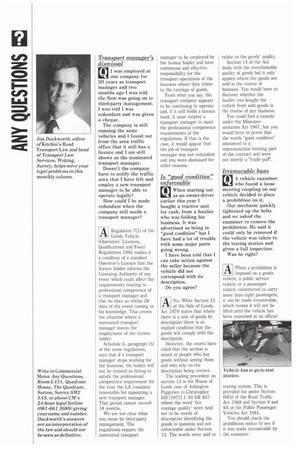Is "good condition" enforceable
Page 36

If you've noticed an error in this article please click here to report it so we can fix it.
When starting out as an owner-driver earlier this year I bought a tractive unit for cash, from a haulier who was folding his business. It was advertised as being in "good condition" but I have had a lot of trouble with some major parts going wrong.
I have been told that I can take action against the seller because the vehicle did not correspond with its description.
Do you agree?
No. While Section 13 of the Sale of Goods Act 1979 states that where there is a sale of goods by description there is an implied condition that the goods will comply with the description.
However, the courts have ruled that the section is aimed at people who buy goods without seeing them and who rely on the description being correct.
The leading precedent on section 13 is the House of Lords case of Ashington Piggeries vs Christopher Hill [1971] 1 All ER 847 where the word 'fair average quality' were held not to be words of description identifying the goods in question and not enforceable under Section 13. The words were said to
relate to the goods' quality.
Section 14 of the Act deals with the merchantable quality of goods but it only applies where the goods are sold in the course of business. You would have to discover whether the haulier you bought the vehicle from sold goods in the course of any business.
You could find a remedy under the Misrepresentation Act 1967, but you would have to prove that the words "good condition" amounted to a representation forming part of the contract and were not merely a "trade puff'.
















































































